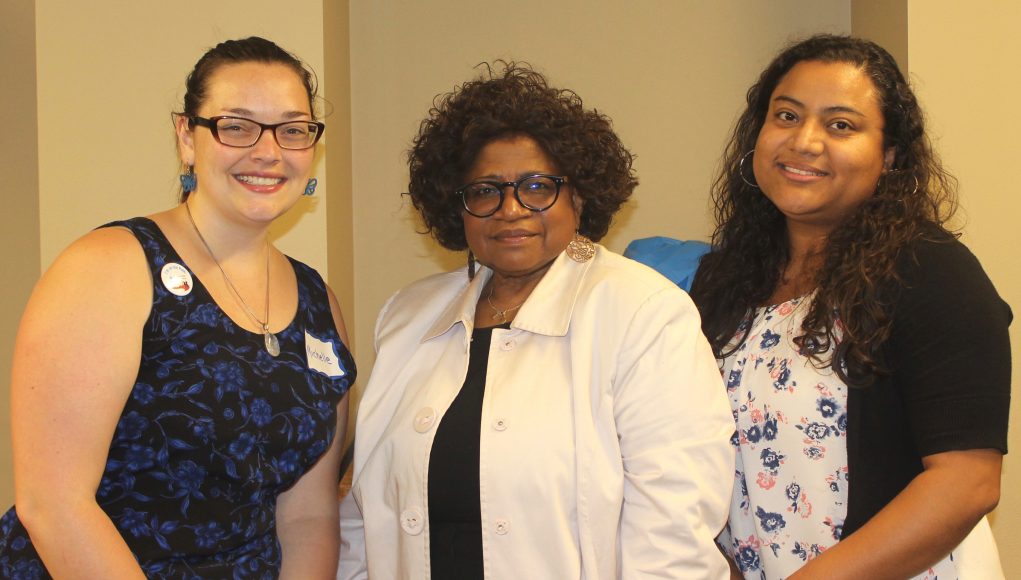It is estimated that there are 12,000-15,000 immigrants in Dane County who have the legal right to advance to citizenship but have not done so for a variety of reasons. A relatively new effort, Madison Path to Citizenship, believes they can help people to overcome the major barriers to citizenship and become engaged, active citizens in the Madison community.
“Nationwide there are almost 9 million people who are lawful permanent residents, folks who hold green cards, who are not advancing to citizenship,” Laurie Greenberg, coordinator for Madison Path to Citizenship for UW-Madison Continuing Studies, tells Madison365. “There are many big barriers including the $680 fee which is going up to $725 next month. Other people are finding it hard to find an attorney they can know and trust and afford.”
Inadequate English language abilities are also a barrier as well as the content of the test which can be very intimidating. “The whole process is difficult. It’s a big barrier just to figure out what the path is,” Greenberg says.
Madison Path to Citizenship is a community-based program created a year and a half ago dedicated to supporting lawful permanent residents (people with green cards) on their path to U.S. citizenship. It is a collaborative effort among community organizations to offer free citizenship education, legal consultation, and citizenship application services to help people overcome barriers to become U.S. citizens.
It’s coordinated by University of Wisconsin-Madison’s Division of Continuing Studies. “It came out of some research I was working on with the UW-Extension looking at Latinos in the Wisconsin community,” Greenberg says.

Local partners include organizations like the Catholic Multicultural Center, Literacy Network, Centro Hispano, UNIDOS Against Domestic Violence, UW-Madison Latin American, Caribbean & Iberian Studies, Latino Academy of Workforce Development, Latino Education Council, Inc., and more. “Everybody said that if we could get help with citizenship that would be great. None of these organizations have naturalization as their mission and they end up having to do parts of it because of the folks that we work with,” Greenberg says. “So, we got a grant from Ira and Ineva Reilly Baldwin Wisconsin Idea Endowment at the university that has given us a budget for three years and we’ve supplemented it with an Emerging Opportunities grant from the City of Madison that enabled us to create an actual citizenship program at Literacy Network.”
The university grant allows Madison Path to Citizenship to host workshops twice a year. “These workshops are a one-stop shop. You come with all of your documents, you register, and you see an attorney who will confirm whether you are eligible to apply for citizenship,” Greenberg says. “The process is a long one and you don’t want to go through all of the work and then have somebody tell you that you aren’t eligible because of this or that.”
Once they are confirmed to be eligible, law school students then help with the 20-page application. “At the workshop, we also screen people to see if they are eligible for the fee waiver,” Greenberg says. “Nationally, about 75 percent of the people who apply for citizenship are low income and very few people actually know about the fee waiver. It’s really an important service.”

Their citizenship work is part of Cities for Citizenship, a national campaign led by the mayors of New York, Chicago, and Los Angeles to create and strengthen citizenship programs throughout the U.S.
Greenberg stresses that citizenship allows permanent, legal residents to fully participate in life here in the U.S. and that by creating a welcoming environment, we improve the quality of life for all of us today and for future.
The numbers of people lined up to take advantage of these services are not quite what Greenberg thought it would be. “I think a lot of people, unfortunately, don’t even consider citizenship because of all the barriers, so they keep renewing their green cards,” Greenberg says. “There are enough benefits to citizenship that it is really worth doing. We’re hoping that as more information gets out that more people use these services that we have to offer.”
The next Citizenship Workshop will take place in spring of 2017. The date and time are not yet set, but will be announced soon. If you need help with naturalization in the meantime, send an e-mail to [email protected] or call (608)263-6735.










